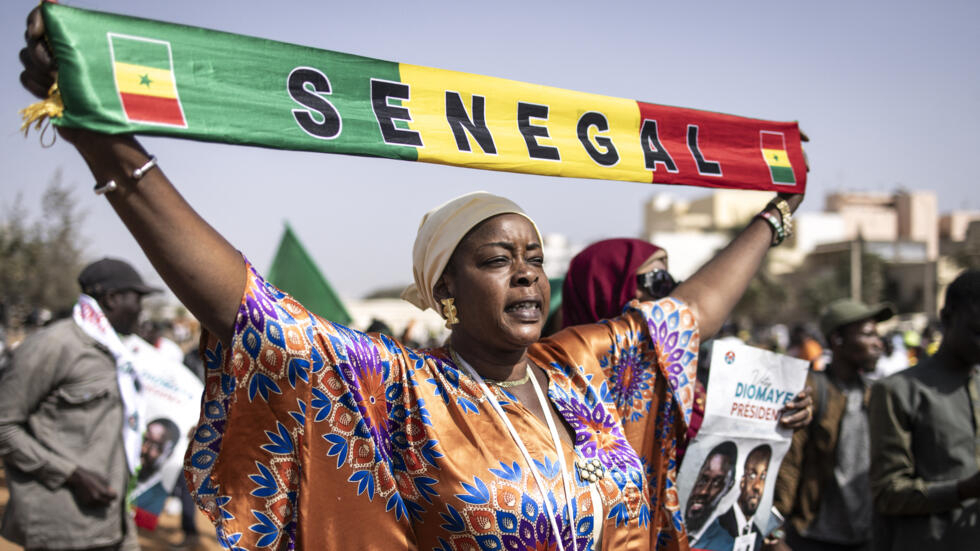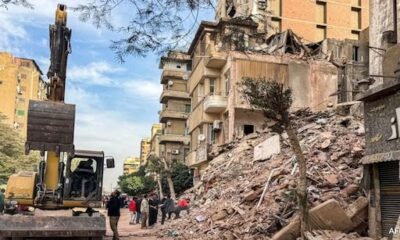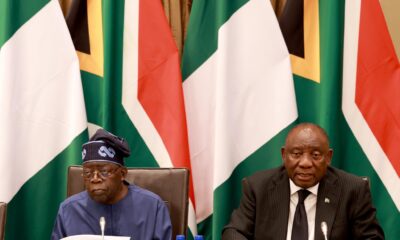Behind the News
Behind the News: All the backstories to our major news this week
Published
9 months agoon

Over the past week, there were many important stories from around the African continent, and we served you some of the most topical ones.
Here is a rundown of the backstories to some of the biggest news stories in Africa that we covered during the week:
Egypt: In defence of bread subsidy
According to Mohamed Mait, Egypt’s finance minister, the nation’s budget for 2024–2025 will allocate $2.66 billion for wheat subsidies and $3.13 billion for petroleum product subsidies. A total of $12.67 billion was set aside for social protection measures, with 134 billion Egyptian pounds going specifically towards food subsidies.
The largest food crisis to hit Africa in forty years is currently affecting communities in Kenya, Nigeria, Ethiopia, and Somalia, among other places. Conflict is the main cause of Africa’s food crisis, as evidenced by the fact that 82% of the record 149 million Africans experiencing acute food insecurity live in conflict-affected nations but Egypt’s case is quite different.
Egypt is a significant importer of wheat, other staple goods, and petroleum into the world market and one of the most affected by poor grain supply in the aftermath of the Russian/Ukraine war. The country is currently dealing with foreign exchange shortages, a gaping budget, and balance of payments imbalances. About 60 million of Egypt’s 105 million inhabitants benefit from the nation’s subsidy program, which provides discounted prices on items like sugar, rice, and bread.
But its disposition towards subsidies is antithetical to the stance of multilateral bodies, the World Bank the International Monetary Fund (IMF) and other international bodies which are its main aid sources as it anticipates receiving more than $20 billion from the agreement mediated by the IMF. The country has moved from the verge of economic collapse to receiving over $40 billion from the UAE, IMF and likely investments from Saudi Arabia in just days in March.
In a 2023 assessment, the IMF contended that the wealthy benefited mostly from these subsidies because they consume the most. In the case of subsidies on energy, higher-income groups primarily profit from energy subsidies and the connection to the power grid is heavily biased toward higher-income people, and electricity subsidies are especially regressive. However, the impoverished would also suffer if they were eliminated. Even though there are notable differences in the types of energy products consumed across income groups, the poor would still experience a significant welfare impact from the elimination of subsidies.
Ongoing development in the Middle East, particularly the Israel and Hamas war as the boundary between Egypt and Israel stretches 206 kilometres (128 miles) along the eastern edge of the Sinai Peninsula from the de facto tripoint with Palestine (Gaza) to the Gulf of Aqaba in the Red Sea makes Egypt a geopolitical interest for the Western powers and its institutions who are tilted towards Israel in the conflict means the aids might not cease despite subsidies. The world cannot afford a broken Egypt at this critical time; cheap bread might just be the key.
Senegal Decides: The end of CFA Franc?
As Senegalese vote for their next president on Sunday, campaign promises of controversial opposition leader, Ousmane Sonko to consider the implementation of reform of the West Africa region’s CFA franc currency at a regional level first, and if that failed, would consider creating a national currency, if his preferred candidate, Bassirou Diomaye Faye, wins the next presidential election.
“We will try to implement a monetary reform at the sub-regional level first,” Sonko said. “If that fails, we will decide as a nation.”
“There’s no sovereignty if there is no monetary sovereignty,” said Faye, speaking at the same press conference.
Sonko claimed that the CFA franc, which is pegged to the euro and is used by eight members of the West African Monetary Union, has an impact on regional economic progress and that it is time to look into other choices.
The CFA stands for the African Financial Community or Communauté Financière Africaine representing two currencies the West African and Central African backed by the French government and have a fixed exchange rate to the euro which are although distinct, practically equivalent. Fourteen countries utilize the CFA franc, 12 of which were formerly French colonies. The French colonies used to use currencies pegged to the French franc, but a number of them departed the franc zone after gaining independence: Tunisia in 1958, Morocco in 1960, Guinea in 1959, Algeria in 1964, Madagascar, and Mauritania in 1973.
Given the level of autonomy attained by many former African French colonies since their independence, particularly in West Africa, critics of persisting neocolonialism object to the monetary situation. With an anti-France wave growing in the sub-region, the spread of military coups and ideological shifts towards Russia and China which are both global rivals to France’s African dominance, and the election launching a new president for Senegal, the jury is out on what would be the diplomatic leanings of the country as incumbent Macky Sall bows out.
South Africa’s ruling ACN struggles
During the week, South Africa’s ruling party, the African National Congress (ANC) threatened legal proceedings against a rival political party, uMkhonto weSizwe (Spear of the Nation) headed by a former president, and ANC chieftain, Jacob Zuma, manifesting a new level of cracks between the party. The party has a bad reputation due to months of unrest between former President Jacob Zuma and current President Cyril Ramaphosa.
In January, the ANC accused Zuma of insubordination and suspended him over what it described as “exceptional circumstances”. Zuma had criticized the ANC leadership in December and said that he would support the newly established uMkhonto Wesizwe (MK) party, which was named for the ANC’s former military wing, which had opposed apartheid but had disbanded when South Africa gained independence. Later on, Zuma declared that he would continue to be an ANC member.
The move seemed to irritate the ANC, whose popularity has been dwindling in recent elections due to high rates of poverty and unemployment in one of the most economically unequal nations in the world. The recent instability around the energy sector has forced the rationing of electricity for over a year and has also become a political point as the country builds up towards its next presidential elections in May.
There is a long history of internal conflict and dissension within the ANC, the first episode being in the 1930s as a result of the conservatives’ win in the late 1920s, which caused the leaders of the party to divide over whether or not to cooperate with the Communist Party. In recent history, however, following Thabo Mbeki’s constitutional ban from serving a third term as president of South Africa, there were indications of dissatisfaction within the party before the 2007 national conference. Had Mbeki been able to secure a third term as party president, he would have had significant influence over the selection of the nation’s next president in 2009 which was strongly challenged by sacked Vice president at the time, Jacob Zuma.
Fresh elections are in view again and the ACN’s turbulent history has repeated itself, with opposition voices like the radical Economic Freedom Fighters (EFF), and a parliament divided across eighteen political parties, the May 29 election might prove to be the biggest test yet for Nelson Mandela’s former party which has ruled South Africa since the end of white minority rule thirty years ago. With Zuma’s political base out of the equation for the ANC, a coalition which the party has also ruled out might be required to remain in power.
Niger: US efforts to regain lost ground in Africa suffers setback
The week began with the Niger Republic, one of the West African countries burdened with terrorist operations in the Sahel, announcing an end to military ties with the United States, dealing a blow to Washington’s recent push for a renewed global influence in Africa.
A surge of terrorism has hit the West African subregion, killing hundreds of people, destroying both private and public property, and uprooting millions of people. States and international organizations both inside and outside the sub-region have created and implemented various mechanisms to deal with the problem in response.
Over a thousand US forces are reportedly stationed in Niger, according to the US military. Furthermore, the US has a drone station in the country’s north, which is crucial for monitoring extremist groups in the Sahel region of Africa, which is located just beneath the Sahara desert.
The event draws attention to the US’s recent efforts to rebuild its alliance in Africa. Niger serves as the centre of US activities in West and North Africa, especially at Air Base 201, one of the most expensive construction projects the US government has ever carried out abroad. Despite its stated purpose of aiding counterterrorism efforts, the project is largely seen as a geopolitical posture against US global rivals China and Russia, both of whom African nations have recently leaned toward for military and economic ties.
International and regional sanctions have been imposed on Niger as a result of a coup that resulted in the removal of President Mohamed Bazoum. The US effectively stopped supporting Niger militarily, and the base’s activities were limited to observation to keep an eye on US soldiers.
You may like
-


Egyptian court upholds ex-presidential candidate Ahmed Tantawy’s sentence
-


Seeking to expand ties in Africa, Indonesia’s Prabowo attends D-8 economic meeting in Egypt
-


Salah wins 6th EPL Player of the Month award
-


Egypt’s November inflation drops to 25.5%, near 2-year low
-


Eight killed, scores injured in Egypt’s collapsed apartment building
-


South Africa clarifies position on relaxing visa rules for Nigerian tourists, business owners
Behind the News
Behind the News: All the backstories to our major news this week
Published
2 months agoon
October 18, 2024
Over the past week, many important stories from around the African continent were published, and we served you some of the most topical ones.
Here is a rundown of the backstories to some of the biggest news in Africa that we covered during the week:
Another look at Africa’s debt crisis
Conversations around Africa’s public debt were on the table during the week as Achim Steiner, administrator of the United Nations Development Programme, stated on Monday that the world’s poorest countries were unable to meet sustainable development targets because they had to prioritise debt payments over investments.
Addressing a gathering in Hamburg, Steiner asserted that the world financial crisis was impeding countries’ ability to accomplish the objectives, which include eradicating hunger and poverty, increasing access to healthcare and education, providing sustainable energy, and protecting biodiversity.
Since the COVID-19 pandemic’s pervasive effects on economies, the majority of the continent’s nations have suffered with both internal and international debt; yet, few have achieved much in the fight for debt restructuring under the G20 framework.
Numerous African nations, including Egypt, Tunisia, Nigeria, Ghana, Zambia, and others, are struggling with significant foreign debt. Together with Zambia and Ghana, Ethiopia will be a part of a thorough restructuring known as the “Common Framework.”
At the opening ceremony of the annual African Union summit in Ethiopia last year, UN Secretary-General Antonio Guterres made the case for changes to the international financial system’s structure to better meet the requirements of developing nations.
Africa’s whole external governmental debt as of 2021 was 726.55 billion USD. The amount of foreign public debt increased from 696.69 billion dollars in comparison to the previous year.
Concerns are being raised by the rising debt levels in Africa, which could not only hinder economic growth but also make repayment nearly difficult for many of these nations. This begs an important question: When does debt stop being beneficial and instead start to negatively impact a nation’s economic performance?
Kenya remains committed to Haiti, but what does it stand to gain?
Kenya will support an international anti-gang effort in Haiti next month by dispatching an additional 600 police officers there. Haiti’s prime minister was in Kenya to expedite the deployment of the military.
At least eleven countries have pledged to send more than 2,900 soldiers to participate in the Multinational Security Support (MSS), led by Kenya.
Kenya, whose participation in international peacekeeping missions is longstanding, declared earlier this year that it would be deploying 1,000 police personnel, citing as a starting point its assistance to a bordering country.
Approximately 600,000 individuals have been internally displaced due to gang conflict, and hundreds of thousands of aspiring migrants have been deported back to Haiti, where approximately 5 million people are facing extreme famine. October marks the end of the mission’s first 12-month term. As gang violence worsened in 2022, Haiti turned for the first time to foreign assistance.
Nevertheless, it failed to identify a leader prepared to assume the helm and numerous foreign governments were reluctant to back the unelected administration in the desperately poor nation.
Kenya gains significant political value by sending its troops to Haiti on the international scene. Kenya has gained international recognition as a trustworthy ally that is eager to assist other nations. The mission opens up various opportunities. Prior to deployment, Kenyan law enforcement forces will receive specialist training and equipment. In the long term, this will increase the force’s capacity. Of course, there are monetary rewards as the participating nations receive allocations of resources. Because troops will receive additional pay, officers are very interested in being deployed overseas.
Cameroon: ‘Healthy’ Biya remains out of sight
Cameroon’s president, Paul Biya can now be likened to the proverbial cat with nine lives as the 91-year-old has remained “healthy” following latest reports of his death during the week. Rumours have been circulating about Cameroonian President Paul Biya’s possible death in a military hospital in France due to his extended absence. This rumour stems from Biya’s prolonged absence following the September China-Africa Summit when he was anticipated to head back to Cameroon almost away.
As of November 6, 1982, Biya, who is 91 years old, has been in office for 42 years. He is the oldest head of state in Africa, the longest-lasting non-royal national leader worldwide, and the second-longest serving president overall. According to rumours, Biya’s oldest son Franck Emmanuel Biya may be named as his replacement for “continuity” in France.
Since its political independence from France and Britain in the early 1960s, Cameroon has only had two presidents. The country is currently dealing with two serious crises: a deadly Boko Haram insurgency in the north and a separatist conflict that has claimed thousands of lives.
President Biya is one of several long-serving African leaders, including Yoweri Museveni of Uganda, who has been in office since 1982, and Teodoro Obiang Nguema Mbasogo of Equatorial Guinea, Rwanda’s Paul Kagame is also gradually evolving into the group.
Things get tougher for embattled Kenyan Deputy President
During the week, the deputy president of Kenya was impeached by the National Assembly due to charges of corruption and abuse of power. In a vote held Tuesday night, lawmakers decisively decided to remove Rigathi Gachagua from office. The Senate will now decide what will happen to the deputy president.
Parliament adopted a proposal to remove Kenya’s deputy president from office, and on Wednesday, the matter was brought to the Senate for consideration. The National Assembly heard a nearly ninety-minute defence of troubled deputy president Rigathi Gachagua and his allies prior to the vote.
A surge of protests targeting President Ruto’s government has been occurring in Kenya over the last four months due to accusations of corruption made by certain lawmakers and government officials. High taxation and the parliament’s purported inability to act independently of the president were other issues that Kenyans objected to. Gachagua refutes the accusations made by certain lawmakers, who claim that the deputy president assisted in planning rallies against the government.
He supported Ruto in his election victory in 2022 and assisted in obtaining a sizable portion of the vote from the populated central Kenya region. Gachagua, however, has mentioned feeling marginalised in recent months, despite extensive claims in the local media that he and Ruto have strained political ties.
After widespread protests over unpopular tax increases in June and July that claimed more than 50 lives, Ruto sacked the majority of his cabinet and appointed members of the main opposition.
Gachagua infuriated many in Ruto’s coalition by comparing the government to a business and implying that people who supported the coalition had first claim to development projects and jobs in the public sector. Ruto has not yet publicly commented on the impeachment proceedings.
Behind the News
Behind the News: All the backstories to our major news this week
Published
3 months agoon
October 3, 2024
Over the past week, many important stories from around the African continent have been published, and we have served you some of the most topical ones.
Here is a rundown of the backstories of some of the biggest news in Africa that we covered during the week:
Musings on CBN rates across Africa: Ghana, Nigeria, and South Africa
During the week, many African countries announced monetary policy decisions. The Central Bank of Nigeria decided unanimously on Tuesday to raise its benchmark interest rate by an additional 50 basis points, to a new record high of 27.25%. This is the sixth hike in a row this year. The decision was made in an effort to reduce inflation, strengthen the naira, and draw in capital. Governor Olayemi Cardoso reaffirmed the bank’s commitment to controlling inflation and underlined how several rate hikes have contributed to its moderation.
Nigeria’s West Africa neighbour followed suit on Friday as the Bank of Ghana reduced its benchmark monetary policy rate by 200 points to 27% at a normal meeting. With inflation having slowed and disinflationary pressures mounting, this is the first decline in eight months and the steepest since March 2018. August 2024 saw a fifth consecutive month of decline in Ghana’s annual consumer inflation, which was still much higher than the central bank’s medium-term target range of 6% to 10%. The country’s annual inflation rate dropped to a nearly two-and-a-half-year low of 20.4% from 20.9% in July.
A week prior, as anticipated, the South African Reserve Bank decreased its benchmark interest rate by 25 basis points to 8% after holding seven consecutive meetings at a 15-year high of 8.25%. As price pressures decreased, the SARB is loosening policy for the first time since the epidemic in 2020
As monetary varying shifts across the continent continue, African nations are still facing numerous severe shocks and significant structural challenges, such as rising food and energy prices brought on by geopolitical tensions like Russia’s invasion of Ukraine, climate issues that impact agriculture and energy production, and ongoing political instability.
Africa’s real GDP growth slowed to 3.1% in 2023 from 4.1% in 2022 as a result of this difficult climate. With growth predicted to reach 3.7% in 2024 and 4.3% in 2025, the economic picture is projected to improve going ahead, underscoring the resilience of African countries.
Zambia and its post-drought plans
Zambia’s finance minister, Situmbeko Musokotwane stated on Friday that the nation intends to quickly recover from its worst drought in living memory and cut its budget deficit in half the following year.
The minister stated in a budget address that the copper producer hopes for a 6.6% growth in 2025, as opposed to a projected 2.3% increase in 2024. The country is aiming for a speedy recovery. as the government crop assessment data shows that over nine million people are affected in 84 of the 117 districts after suffering through the driest farming season in over forty years, which has led to considerable crop losses, an increase in livestock deaths, and worsening poverty,
Real GDP increased gradually between 2022 and 2023, from 5.2% to 5.8%. The supply side was driven by mining and quarrying, wholesale and retail commerce, and agriculture; the demand side was driven by consumer and business spending. Food prices, transit expenses, and the nominal exchange rate are the key drivers of inflation, which is expected to remain elevated and reach 11.0% and 10.9% at the end of 2022 and 2023, respectively.
The economic challenges faced by Zambia are exacerbated by the drought, especially when considering its debt load. Its debt restructuring talks under the G20 Common Framework have progressed far more slowly than was originally anticipated when the Common Framework was first proposed.
In 2017, Zambia was placed under debt distress, and as a result, non-concessional lending from multilateral development banks was discontinued. It’s possible that by overestimating sovereign risks, the main credit rating firms exacerbated the debt crisis and dealing with a post-drought crisis might just be another “too high hurdle”
As the World Bank and Uganda LGBTQ saga continues
The World Bank is taking more action in support of Uganda’s LGBTQ community. The global lender announced on Wednesday that it is implementing steps to guarantee that lenders to Uganda are not subjected to discrimination due to a severe anti-gay law. According to a World Bank representative, both new and continuing projects would be subject to the procedures, which also include an impartial monitoring system to guarantee compliance.
Same-sex partnerships are forbidden and punishable by life in prison; similarly, anyone convicted of “aggravated homosexuality” faces the death penalty. The Anti-Homosexuality Act (AHA) was passed by Uganda, a largely conservative nation, in May of last year and it has led to considerable Western censure and US penalties.
Other than Uganda, several African nations have strict laws that discriminate against individuals who identify as LGBTQ. Hakainde Hichilema, the president of Zambia, issued a warning in March to supporters of the LGBTQ movement to stop endorsing homosexuality. He also asked that Zambia “maintain laws that abhor alien orientations like gayism and lesbianism.”
South Africa, which has a constitution that forbids discrimination based on sexual orientation, was the first and only African nation to legalise same-sex marriage in 2006. Some African nations, such as Angola, Mozambique, Botswana, Lesotho, Mauritius, and Seychelles, have laws that are favourable to the continent’s population but Uganda appears to be unbothered or tempted despite the many causes and costs of its anti-gay stand.
Ahead of Tunisia’s presidential election
During the week, another Tunisian presidential candidate Ayachi Zammel was convicted and sentenced to six months imprisonment for using “fraudulent certificates” as opposition voices in the North African country continue on attack as President Saied positions himself for what is likely to be a reelection, as all but one of the opposition candidates are either incarcerated or have had their eligibility ruled invalid by the Tunisian electoral commission.
On September 19, a third candidate who had received the election commission’s approval was sentenced to 20 months in prison. Saied, who is currently running for reelection for a second five-year term, was originally elected in 2019 as an anti-establishment candidate who pledged to combat poverty and eradicate corruption. However, in 2021 he declared that he would rule by decree after overthrowing Mohamed Ennaceur and the elected parliament, a move denounced as a coup by the opposition and the international community.
Additionally, he has deployed more oppressive strategies, which may indicate that he is not confident in his ability to win with conviction. His severe actions could indicate a new stage in Tunisia’s democratic backsliding and foreshadow more crackdowns and turmoil during an inevitable second term.
Meanwhile, concerns exist over potential voting turnout as well. Under Saied, Tunisia has conducted three elections, with dismal voter turnout in each. Less than one-third of voters cast ballots in favour of a new constitution that solidified Saied’s power and overthrew the 2014 charter in July 2022. After Saied dismissed the previous legislature in December 2022, only 11% of voters cast ballots for new members of parliament, which is among the lowest turnout percentages ever recorded in a national election worldwide. The next December, Saied called elections for a new second house of parliament, repeating this dubious performance.
EDITOR’S PICK


DR Congo sues tech giant Apple over illegal mineral exploitation
The Democratic Republic of Congo (DRC), has filed a criminal case against the European subsidiaries of tech giant, Apple, accusing...


UNESCO lists Ghana’s Kente cloth as cultural heritage
The iconic Ghanaian Kente, a piece of clothing, has been recognized as a cultural heritage on UNESCO’s Representative List of...


Zambia: FOX report highlights persistent media harassment, calls for reforms
A new Freedom of Expression (FOX) report by the Media Institute for Southern Africa (MISA) Zambia, has raised concerns over...


Egyptian court upholds ex-presidential candidate Ahmed Tantawy’s sentence
Former presidential candidate, Ahmed Tantawy, and his campaign manager, Mohamed Abou El-Diar, were found guilty of faking election paperwork, and...


Court orders Uganda to compensate LRA war crimes victims
Uganda’s tribunal has ordered the government to pay up to 10 million Ugandan shillings ($2,740) to each victim of Lord’s...


Nigeria: 614,937 killed, 2.2m abducted in 1 year— Report
A new report released on Tuesday by the National Bureau of Statistics (NBS) has revealed that over 614,937 Nigerians were...


Seeking to expand ties in Africa, Indonesia’s Prabowo attends D-8 economic meeting in Egypt
According to the government, Indonesian President, Prabowo Subianto, travelled to Egypt on Tuesday to attend meetings of the D-8 Organisation...


M23 Angola peace talks break down as Congo, Rwanda dash hopes
Hopes of an agreement to end Congo’s M23 rebel conflict, which has displaced over 1.9 million people, were dashed when...


Nigeria obtains $600 million international loans for agriculture
To promote food security and rural development, the Nigerian government, through the Ministry of Agriculture and Food Security, has obtained...


Nigeria’s November inflation rate hits 34.60%
According to figures released by the statistics office on Monday, Nigeria’s inflation rate increased for the third consecutive month in...
Trending
-

 VenturesNow12 hours ago
VenturesNow12 hours agoNigeria’s November inflation rate hits 34.60%
-

 VenturesNow12 hours ago
VenturesNow12 hours agoNigeria obtains $600 million international loans for agriculture
-

 VenturesNow12 hours ago
VenturesNow12 hours agoIMF’s latest board reviews result in $182 million to Rwanda
-

 Politics12 hours ago
Politics12 hours agoGhana will not leave IMF but wants adjustments, says President-elect


